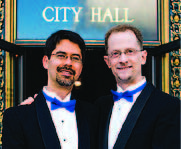 When I called my uncle on June 26 to tell him that the U.S. Supreme Court had ruled in favor of marriage equality, I could tell from across the country that a big smile had come to his face as he said to me with pride his voice, “June 26th would also have been your grandfather’s birthday.” With all the landmark LGBT rights decisions that have come down over the years on June 26, it feels like that date should be a national holiday, and my uncle’s words that day reminded me how June 26 is a personal holiday as well.
When I called my uncle on June 26 to tell him that the U.S. Supreme Court had ruled in favor of marriage equality, I could tell from across the country that a big smile had come to his face as he said to me with pride his voice, “June 26th would also have been your grandfather’s birthday.” With all the landmark LGBT rights decisions that have come down over the years on June 26, it feels like that date should be a national holiday, and my uncle’s words that day reminded me how June 26 is a personal holiday as well.
My uncle died last month at age 94 after a long illness. It’s a sad time for our family, but also a time to reflect on what a wonderful long life he had, and how much change his generation has witnessed.
When I first came out to my family, we were on vacation at my uncle’s home in New England—the same house my grandparents had lived in, and my great-grandparents before them. The sense of familial history was all around us, as some of my family wrestled with what seemed like a very modern problem to them—how was it that they had a gay son? My uncle, a professor of mathematics, was often a voice of calm and reason at moments like these that could help our family negotiate turbulent times.
A product of the Depression era, my uncle was notoriously thrifty, saving absolutely everything and never passing up a good deal. He was careful with money, but generous with love; all of my sisters and brothers adored him. And he was lucky in love. He and his wife spent almost four decades together, and as his health declined, it seemed like their love only grew. The steadfastness of her love and care for him recalled for us the moving words of Justice Kennedy in the Obergefell decision of June 26:
“Marriage responds to the universal fear that a lonely person might call out only to find no one there. It offers the hope of companionship and understanding and assurance that while both still live there will be someone to care for the other.”
My uncle and his wife truly lived out these ideals, and the selfless way she honored their wedding vows— in sickness and in health, till death do us part—in his final days and months was a great testament to the meaning of their marriage and the bond they shared.
We have come so far over the past 90 years, from the love that dare not speak its name, to lives lived out loud with pride. The world my uncle was born into would be unrecognizable to the child who is born today. As we remember my uncle’s life and legacy, it seems the best way to honor our elders—in our birth families, chosen families, and communities—is to celebrate their lives and their loves. How fortunate we are to have lived to see a better day, and to have the opportunity to make things even better still for the generations yet to come.
Stuart Gaffney and John Lewis, together for three decades, were plaintiffs in the California case for equal marriage rights decided by the California Supreme Court in 2008. They are leaders in the nationwide grassroots organization Marriage Equality USA.
Recent Comments